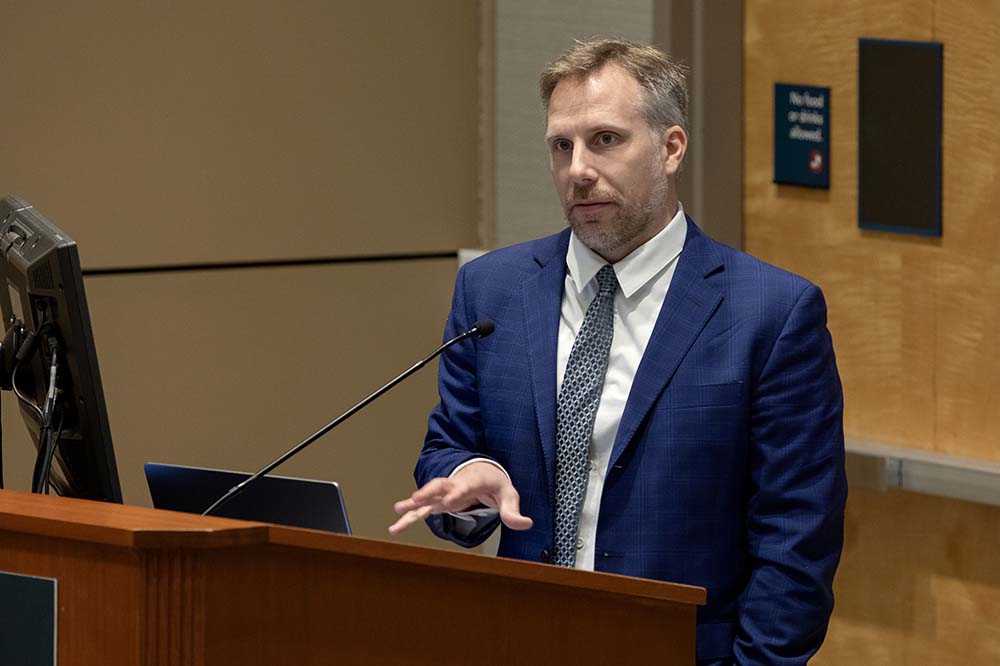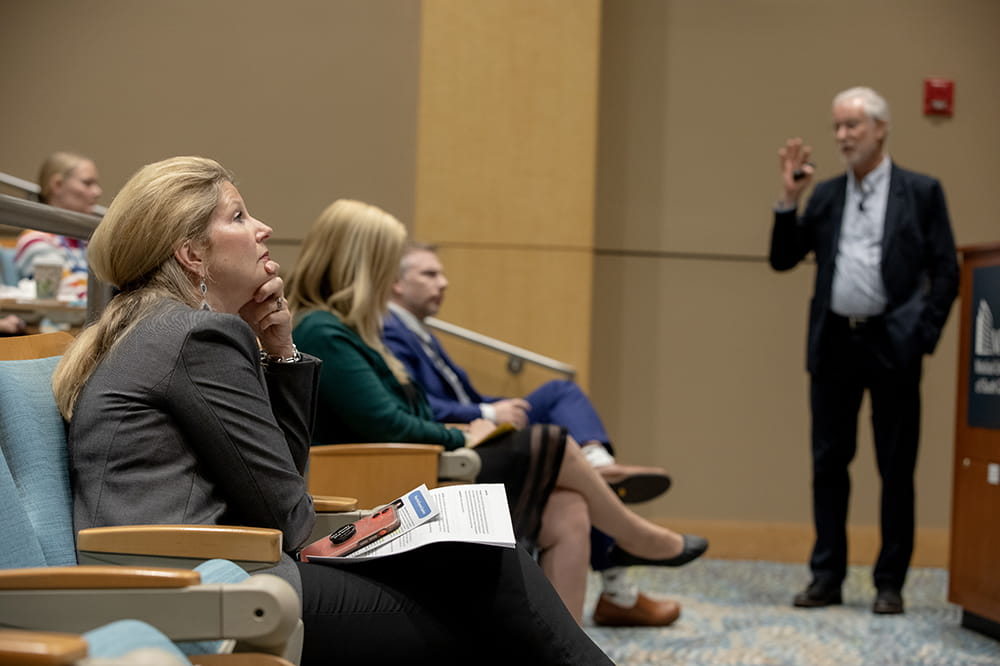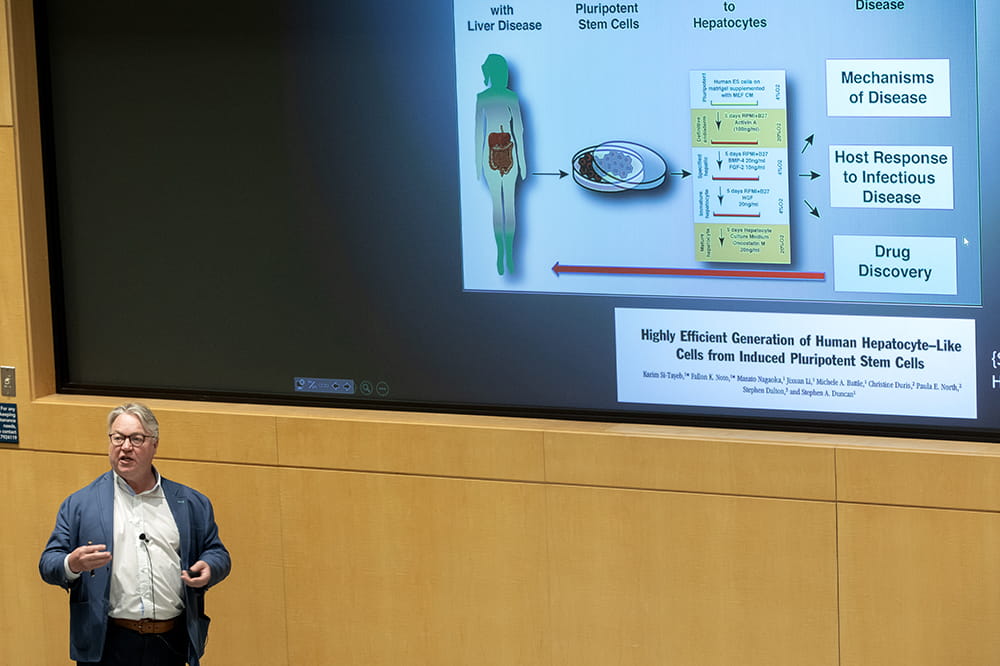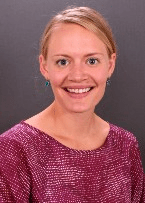The Medical University of South Carolina is putting precision health front and center, bringing together experts to talk about what it is, how it's being used and what the future may hold. MUSC recently held a Precision Health Research Symposium, led by Lori L. McMahon, Ph.D., vice president for Research and a professor of Neuroscience.
"The landscape of medicine and health care is undergoing significant transformation with precision health as a top priority. This evolution is a result of our deepening understanding of genomics and data science, which has opened the door for more precise, individualized health care," McMahon said.
The event included speakers from MUSC, the University of Alabama-Birmingham, the HudsonAlpha Institute of Biotechnology, Helix and the Greenwood Genetic Center. They talked about the roles of data, genomics, research and systems in precision health.
Precision health through data
Matt Might, Ph.D., director of the Hugh Kaul Precision Medicine Institute at UAB, made a bold prediction: Historians will see data, a key aspect of precision health, as the biggest treatment of this century.
"I see precision medicine, really, as this field that delivers data as a drug. To do it right, precision medicine really needs computation. There's no way around managing the massive amounts of data from genomes to images without heavy intervention from computation."
Computation is key, he said, in addition to other help from technology, including artificial intelligence. Mightgave a real-life example of how AI can improve patient care. It involved a 19-year-old woman named Kelsey who was suffering from intractable cyclic vomiting syndrome. "I think she was 5 feet, 4 inches tall, but weighed 75 pounds. She was severely malnourished at this point, suffering dozens of vomiting episodes per day," Might said.

"Her medical team said, 'Look, we've tried everything that we know about in this case, and nothing seems to be working.' But everything they tried totaled 25 things. To be fair, 25 things is a lot. But it's not absolutely everything."
So Might and his team, experts in precision medicine, put their technological skills to work. They used artificial intelligence to scan millions of medical research articles about nausea and unearthed a treatment that hadn't been tried with Kelsey: nasally inhaled isopropyl alcohol.
To their relief, it worked. Kelsey's life changed dramatically.
"If you fast forward eight months, not only has she not vomited since, but she was able to use this again to successfully arrest every episode of nausea. She was up to 125 pounds. And she was feeling well enough to get married," Might said.
Precision health through genomics
Not every precision health story ends with a wedding but some do include life-changing diagnoses, treatments and more. And they begin, in some cases, with the use of genomics.
Genomics is the study of a person's genes and how they interact with each other and the environment. Bruce Korf, M.D., knows a lot about that. He serves as associate dean for Genomic Medicine at the UAB School of Medicine and chief genomics officer.
Korf's talk at MUSC focused on how genetic information can help patients, particularly people with rare diseases. Doctors refer patients to his team, which looks at their cases and when needed, performs genetic testing. That sometimes leads to a diagnosis that wasn't obvious before. That, in turn, can lead to the right treatments.

And Korf sees an even greater role for genetic testing in the future – despite mixed public perceptions about it. "How do you get clinicians to use genetic and genomic testing in day-to-day practice? Some clinics are really eager to adopt genetic testing, while others are more hesitant," he said.
As technological innovation, clinical utility, implementation and education continue to evolve, Korf said genomics and precision health will become more routine. "I think if you went to sleep and woke up in 20 years, you would not recognize the practice of medicine."
And that could have big benefits, not only for people with rare diseases but also more common ones such as Parkinson's and Alzheimer's. Speaker Richard Myers, Ph.D., chief scientific officer, faculty investigator and president emeritus of the HudsonAlpha Institute for Biotechnology, talked about studying the genetics of neurodegenerative diseases. "It's slow going but really important," he said.
Also important, in his view: encouraging the public to participate in programs such as In Our DNA SC, a statewide effort to improve access to personalized health care and create a genetic and research database. Alabama has its own version. Both rely on the public's willingness to get involved.
"Why do people participate in a population-facing component? They want to contribute to research and have an interest in their own future health. They want to help their children and grandchildren," Myers said.
Precision health's role in research
That idea of looking toward the future, a future with new health care options for a range of ailments, informs the work of researchers using precision health.
Several speakers talked about that, including Dan Judge, M.D., a professor in the College of Medicine at MUSC and the leader of In Our DNA SC. In Our DNA SC's genetic and research database will help scientists for years to come. "We need to go from a disease-first to a gene-first approach. Let genetics lead the diagnosis," Judge said.

Other scientists weighed in on the role of precision health in research by highlighting how they're using it, including:
- Alain Greige, an M.D.-Ph.D. student of Neuroscience at MUSC. He's working with Christopher Cowan, Ph.D., chair of the Department of Neuroscience, on an RNA-based approach to treating neurodevelopmental disorders.
- Steve Duncan, Ph.D., chair of Regenerative Medicine and Cell Biology at MUSC. He's looking at possible treatments for a genetic disorder that causes high cholesterol levels.
- Saverio Gentile, Ph.D., associate professor in the Department of Cell and Molecular Pharmacology and Experimental Therapeutics at MUSC. He's looking for new ways to target and treat cancer.
- John Wrangle, M.D., associate professor in the College of Medicine who treats patients in Hollings Cancer Center. He gave a broader take on the role of precision health in cancer research.
Precision health systems
These research projects wouldn't be possible without a systematic approach. And as the name suggests, precision health requires precision when it comes to the systems needed to implement it.

Caitlin Allen, Ph.D., an assistant professor in the Department of Public Health Sciences at MUSC and the director of Outreach and Implementation Research for In Our DNA SC, was among the speakers talking about getting systems in place to leverage precision health on a large scale, with attention paid to including everyone.
And representatives of Helix, a population genomics company and MUSC partner for In Our DNA SC, talked about standardizing the process of screening for health conditions. Nicole Washington, Ph.D., director of Research and Clinical Informatics at Helix, talked about a new approach. "The use of genomics in health care today is inefficient and inadequate. We need to change the model of how it's done."
Here's one way she suggested doing that when it comes to genomic screening. "Stop treating it like a one-off. We're proposing going back into that sequence as much as possible for a patient's lifetime. Sequence once, query often."
Finally, representatives of the Greenwood Genetic Center, Rich Steet, Ph.D., and Heather Flanagan-Steet, Ph.D., discussed integrating research into clinical genetics care. Their South Carolina nonprofit provides genetic services, diagnostic testing, educational programs, resources and research into medical genetics.
Precision health going forward
So what's next? A lot, according to host McMahon. Precision health is an important part of the present and future of health care at MUSC and beyond.
"Harnessing the information in our DNA for research has the power to drive discoveries further and faster than ever before. With ever-advancing technologies, we are more equipped than ever to explore the intricacies of the human genome with unprecedented depth and precision," she said.
"By studying the genetic variations among individuals and populations, we can uncover crucial insights into the causes and progression of diseases and ultimately inform potential treatment strategies now and for generations to come."






